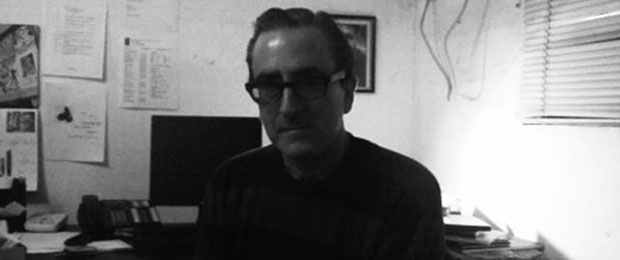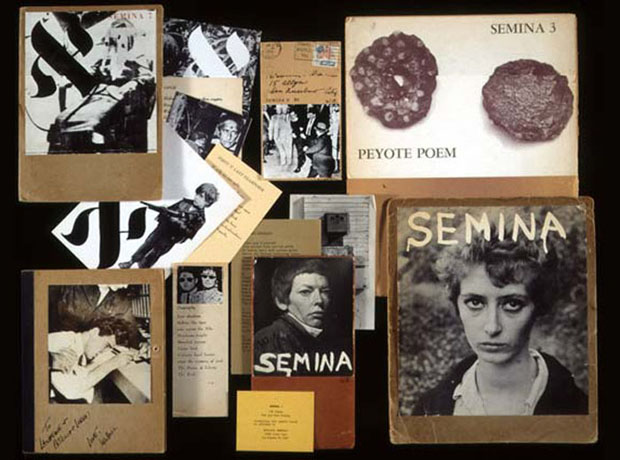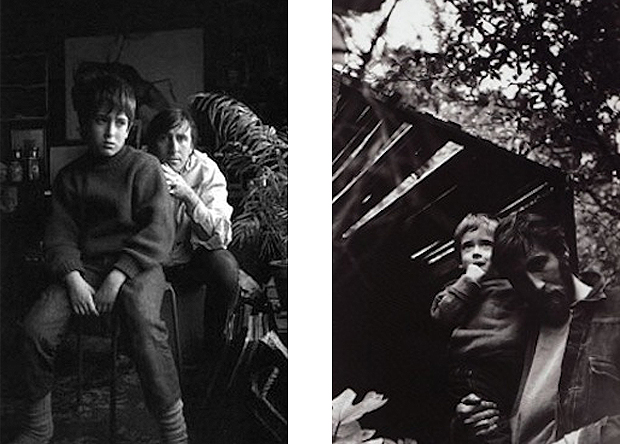For those of you who have trawled through the Testimonials section of my website, you will have found numerous pictures of a young boy either with his father or playing with a toy rifle. That boy is Tosh Berman, now the owner of TamTam Books and book buyer for Book Soup in Los Angeles.
His father, Wallace Berman, is one of my favourite graphic artists and a constant inspiration to my life and work. The persuance of his art and single-mindedness of vision will go on inspiring generations of artists and designers, I'm sure. The book Semina Culture (2005), named after Wallace's verfax collage art, focuses on the art of Berman and the counterculture of creative people who made up the Californian Beat community in the 50s and 60s. As a strange aside, Wallace also appears on the cover of The Beatles' Sgt. Pepper's Lonely Hearts Club Band.
Tosh is a purveyor of taste and a commentator on popular culture in my eyes. His press, TamTam Books, is fabulous, with impeccable taste, and has published the works of Boris Vian and Serge Ganinsbourg among others. His current YouTube series Tosh Talks reviews contemporary book releases and is a wonderful insight into Tosh's aesthetic. I've been wanting to catch up with Tosh for some time, so I'm excited to be able to present this interview.
You seem like someone who has as deep an infatuation with the city you live in as Woody Allen does with New York or Emily Bronte with the Yorkshire Moors. The last time I was in Los Angeles I discovered for the first time just how beautiful the city is. What is it that still excites you about L.A.?
Strange enough, the mixture of history and having no respect for it! It is a charming aspect of Los Angeles that it's a city with an incredible amount of culture, yet so many are not aware of it. The second World War, with all due respect, actually was a great war for Los Angeles! For one, it brought a lot of European artists to the Los Angeles area for the purpose of finding work in the dream factories, better known as movie studios. Some succeeded and some didn't. But all are fascinating. The combination of Bertolt Brecht, The Mann Brothers, The Marx Brothers, Schoenberg, Stravinsky, Man Ray (American, but he lived in Paris for many years and came back due to the war crisis), and others. Also the light here is incredible. David Hockney has mentioned this many times and he's totally correct. Right now I am in front of an open window and the breeze is incredible and warm. Also it's the king location for noir literature – Raymond Chandler for example. And it is ugly in parts, but makes the good looking parts of the city even more beautiful.
What is happening at TamTam Books at the moment?
The great big great thing that happened is that I now have world distribution with D.A.P. They mostly do art, photography and fashion books, but also distribute cool presses like Exact Change, Wakefield Press, and... mine! I just released a major biography on Serge Gainsbourg called Gainsbourg. The author Gilles Verlant has spent over 100 hours interviewing the great songwriter/performer and it is without a doubt the best book in English on the French pop music scene from post-war 1950s to the 1990s. Remarkable. And my translator, Paul Knobloch, did a remarkable job in translating Gainsbourg's lyrics. So this is it with respect to Serge and his world. Other titles that are coming out next Spring include the French gangster Jacques Mesrine's memoir The Death Instinct, translated by Robert Greene, who wrote The 48 Laws of Power. Interesting combination of writers there! Then there's another Boris Vian classic, The Red Grass, which will also be translated by Paul Knobloch. And last but not least, Words And Music: The Selected Lyrics of Sparks, edited by Ron and Russell Mael of Sparks. Michael Bracewell is going to be doing the introduction of that book – so as a life-long Sparks fan, this book is a dream come true for me.
Is your time equally spent between TamTam Books and Book Soup these days?
Yes, but that will change on August 4th, my first day as a full-time TamTam Books person. I am leaving Book Soup to fully concentrate on TamTam Books as well as on my writing. By chance, I saw my reflection in the mirror and I thought "it's now or never,” as one hears from Elvis. So I am leaving the great adventure of book buying for a really cool store to the world of publishing and writing full-time.
When did your obsession with Boris Vian start?
About 20 years ago I was in Japan with my Japanese-born wife Lun*na Menoh and she read some of my short stories that I was working on at the time. Her comment regarding my little narratives was that they reminded her of the writings of Boris Vian. The name sounded sort of familiar, and my first thought was that he was either a musician or a songwriter – but I never heard his music at the time, or read any of his books. But her commentary on him was fascinating, and all his books were translated into Japanese and were in print there at the time. Once I got back to Los Angeles, I started researching him at the downtown library (one of the great libraries of the world, but that's another story) and found a cheap paperback version of I Spit on Your Graves. The book is interesting, but the back story of this book is super fascinating. Vian made a bet with his publisher that he could write a noir thriller over the weekend. This was in 1947. Vian did it, and the publisher published it. The twist here is that Vian wrote it under the name "Vernon Sullivan", a pretended Black-American writer, with Vian credited as its translator. All hell broke loose when the French authorities decided to ban this book due to its violence and sexual imagery, but mostly because they thought it came from America. At the time, some parts of the French world were against American culture sneaking in, and they wanted to ban people like Henry Miller, etc. So there is plenty of irony here. For one, the story is about a white negro (he looks white but is actually black) who commits a mini-rape/mass murder action against a small town in America because the town witnessed a lynching of the main character's brother. The first irony is that Vian never went to America. Secondly, it's ironic that the French authorities went after this book because it was decadent literature from America. And third, Vian kept the identity a secret till the trial took place. After a girl was murdered with I Spit On Your Graves beside her body with all the violent scenes underlined – it was at that time Vian had to admit he wrote the book and made up the character Vernon Sullivan.
So besides that fascinating scandal, Vian's character came to me as someone who was totally an essential figure in the Post-War Paris years. He was the guy who connected Jean-Paul Sartre to Miles Davis to Juliette Gréco, and so forth. He knew everyone. And besides writing noir literature, songwriting, and singing, he was a playwright, and on and on. He was also an incredible novelist of surreal fiction – but solidly focused on the Saint Germain des Prés scene in his...own fashion. Wonderful writer and truly a fascinating figure in 20th century literature.
What is it about Serge Gainsbourg?
What is there NOT about Serge Gainsbourg! Incredible music artist. To me he's a combination of Johnny Rotten and classic-era Bob Dylan. But better! And Gainsbourg really ties into the TamTam World. Vian was one of the first known personalities that gave Gainsbourg critical acknowledgment for his singing and his songs. Throughout Gainsbourg's life, he always gave credit to Vian for the push to get his work out there. And beyond that, Serge was the focal point of French pop music culture. If the Beatles opened doors for the English-speaking market, then Gainsbourg did the same for the French-speaking world. Incredible poet/lyricist and his recordings are the ultimate works of pop recording. Superb personality.
I've enjoyed what I've seen of the Tosh Talks series. Where did the idea for that come from and is it something you enjoy doing?
Ah, the 21st Century at work! I was frustrated that at work I couldn't spend time talking about books that have fallen through the cracks – due to their so-called difficult subject matter, or people tending not to write about them. Also hundreds, maybe thousands, of titles come through the store on a yearly basis – and a lot get ignored. That's painful for me! So, doing the YouTube blog thing was mostly for my fellow co-workers at Book Soup. I thought it would be easier if I talked to a camera about a specific book and showed it to them. Or put it on the Book Soup blog. But I also sent the Tosh Talks show to publishers and all the arms and legs from that world that reaches out to others – so now the audience has gotten kind of large and I attract people who are interested in reading literature that they may not have heard of, or didn't have the means to be exposed to. But I also get a lot of commentary from people who are interested in the visual layout of the Tosh Talks show. Besides me and the books, there is my collection of striped shirts and that strange glass of orange juice on the table. Lots of people are fixated on that glass of orange juice for some strange reason...
Your father, Wallace, is a constant inspiration to me. His DIY ethics (two decades before punk) are something for myself, and many others, to aspire to. Are you at all proud of his legacy?
Well, I love the man, and his death after so many years is still shocking to me. I never got over it. Am I proud? Yes. He had the vision thing down, and he totally understood his world at the time. A remarkable man. I have only known two geniuses: one is my Dad and the other is my wife, the artist Lun*na Menoh. I am really a groupie of sorts for the genius types. But yeah, without a doubt I think of my father whenever I put out a TamTam title. In many ways he reminds me of Boris Vian.
For someone like me, who grew up in middle-England, the pictures in Charles Brittin's book West and South seem to depict a perfect bohemian childhood. Was it?
At that time I guess it was a perfect bohemian childhood, but then again, how would I know? My life was very sheltered till I went to kindergarten, and then I noticed, “Ah, other kids have a different lifestyle.” But till then I didn't know. It was a beautiful period – I say up to 1967. But going toward '68, the hippie love thing turned into a hippie death drug thing, I think mostly because by that time kids were coming to L.A. and other big cities to join in on the hippie bandwagon. The whole scene started out with really brilliant people/personalities and when others came in – they really didn't add anything except their hang-ups or the reasons why they left their "normal" world. In other words, they brought their problems with them. It’s a shame, because for a moment or two the world opened up in a very beautiful way. But such is human nature, it destroys what is beautiful.
Were the people around you when you were growing up as decadent as they're often portrayed?
To others, maybe decadent; but to me, no. You have to understand that I pretty much had a very tight family structure around me. I had a father and I have a mother – and at the time I had two sets of grandmothers and one grandpa. And I visited my grandparents maybe once a week. One weekend I would stay with my Dad's mom, and the next week with my Mom's parents. So it was perfectly great. And lucky them, they had the weekend to themselves! So yeah, I was raised with a very strong family structure. I had both a father and mother throughout my childhood. And not a lot of kids had that structure in their lives.
But back to the decadent part – it's a special childhood that when you go to bed at night you say goodnight to Brian Jones of The Rolling Stones, who is on the living room floor listening to records and drinking wine – I mean, how great is that? The family was surrounded by poets, painters, architects, and pop singers and musicians. If they were decadent they were open to it, but mostly they were a great crowd – and for a while our house in the late 50s and early 60s was an open house – so, non-stop parties and crowds of very interesting people. Warhol shot his first feature length film, Tarzan and Jane... Regained at our house. I played Tarzan's son “Boy.” Lots of work was done in those days. So decadence doesn't come to mind. But life as pleasure – yes, that was the case.
What is your overriding feeling when you look at books like Semina Culture?
Well it’s a great book. But also it's strange to have something like a family photo album available for the public to look at. It’s great, but odd at the same time. And I am also proud that a book like that exists. I wish it was still in print (D.A.P. hint, hint) because it's an important book, not only about my Dad & Mom, but also all the people who were involved with my family. There are some great artists in that book. It's a great document. Kristine McKenna and Michael Duncan did a remarkable job on that book. Both should be applauded.
Absolutely, it's one of my most treasured art books. Did you have much understanding of what was happening around you when you were growing up?
Yes. In a great way no one knew what was going to happen in the future. Basically, my parent’s world was getting up and going to bed at the same time every day. Dad and Mom never really thought about the future, they were both very much part of the moment as it was happening. So in that sense, the answer to that question is yes.
Is it true that you were in Andy Warhol's first full-length film Tarzan and Jane…Regained?
Afraid so! We talked about this before and I have a strong memory of the day because it was so unusual for someone to be over at our house and we're all play-acting. My Dad played the white-hatted hunter, and Taylor Mead played my dad, Tarzan. I was Boy. I saw the film not that long ago and it made me cringe to see myself on the screen. On the other hand, it's an extremely important document of a time and a place. And even though I have strong memories of the day of the shooting, I have no memories of Warhol. And without a doubt he was there, but, as someone who knew him then told me, that's not unusual!
That's so hilarious given how much he shaped the post-war world. Do you happen to own a television set these days?
Now I do, but it's not hooked up to cable. I watch DVDs on it. As a small child we didn't have a TV. But we got one maybe when I was around 8 or 9 years old. My first memory of something important on TV was the Kennedy assassination.
Is there any contemporary music that you're excited about?
I'm not that crazy about contemporary “right this second now” music. There is so much great stuff from the past that I'm checking out at the moment. I always love people like Morricone – that man is a genius, right? Besides that, I love every new Sparks album and the new Blur single The Puritan is incredible. A masterpiece!
To be honest I had no idea that Blur had any plans to record again! From what I've heard the new record sounds like a depature for them and I enjoyed the synth sounds. I heard that you went to every performance of each Sparks album in London. What makes them so special for you?
The whole trip started off in Paris and then eventually went into London for the 21 concerts that Sparks gave – which was amazing. I wrote a book about it called Sparkstastic, which is about the shows, their music, and their image, and it is also a travel journal of sorts with lots of commentary on London and Paris. That book is coming out next Spring, published by Barnacle Books.
What are you currently obsessed with?
For me, to be obsessed is to be alive! Music and books are the main thing for me right now. Sparkstastic is about the music/film/book world but seen through the eyes of Sparks' music. It is always fascinating to follow an artist's work, which in turns opens up a whole world for you. And that is the best relationship between fan and artist. The new Blur record is really turning my head/ears around. One song! But a perfect record in my opinion. My other obsessions right now are the writers Albert Cossery and Enrique Vila-Matas.
You can find out more about Tosh Berman on his TamTam Books blog HERE









